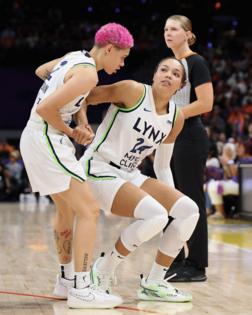UConn coach Geno Auriemma weighs in on WNBA officiating controversy, Napheesa Collier injury
Published in Basketball
STORRS, Conn. — UConn women’s basketball star Azzi Fudd felt a familiar pit in her stomach when former Huskies standout Napheesa Collier went down with an ankle injury during the final seconds of Game 3 of the WNBA semifinals on Friday.
Fudd was grateful she missed the moment in live action, but she saw the replays of the Minnesota Lynx star’s foot twisting gruesomely after Phoenix Mercury forward Alyssa Thomas collided with her legs while trying to recover a clean steal. Watching other players go down always hits close to home for the redshirt senior, who has overcome a lengthy injury history during her college career.
“Watching all season the physicality, you could see that in every game. … That’s grown woman strength out there, and I feel like some of the stuff is too much,” Fudd said. “When you see players get hurt, as someone who’s had their fair share of injuries ranging from small to larger ones, you never want to see that regardless of the team or the player. … That hurt to see, and I felt for her.”
When no foul was called after Collier’s injury, it was a breaking point for longtime Lynx head coach Cheryl Reeve. She stormed onto the court to berate the nearest referee and had to be pulled away by multiple assistant coaches and players. Reeve was ejected, and she railed against both the officiating crew and the league itself in her postgame press conference for the excessive physicality throughout the series.
“If this is what our league wants, OK. But I want to call for a change in leadership at the league level when it comes to officiating. It’s bad for the game,” Reeve said after Minnesota’s 84-76 loss. “The officiating crew that we had for tonight, for the leadership to deem those three people semifinals playoff-worthy is (expletive) malpractice. I can take an L with the best of them. I don’t think we should have to play through more than what they did.”
The WNBA suspended Reeve for Game 4 of the series and fined her $15,000 — believed to be the largest individual fine in league history — for her conduct on the court and comments to the media. Collier also missed Game 4 due to her ankle injury, and the Lynx were eliminated from the playoffs with an 86-81 loss to the Mercury.
UConn coach Geno Auriemma empathized with Reeve’s meltdown, even though he didn’t disagree with the no-call on Thomas’ steal. Complaints about the physicality allowed in the WNBA are not unique to this season, and coaches across the league have aired frustrations all year about inconsistencies in officiating.
“I don’t think their coach reacted the way she reacted on that call. I think reaction was on an entire game of that in which a lot of it was not incidental,” Auriemma said. “I don’t mean intentional towards any particular player, but it’s an intentional grab and hold and all the things you can get away with in the WNBA. I think that probably just added up, added up, added up, and then you lose your mind and do things you wouldn’t normally do.”
Auriemma has sent more players to the WNBA than any other coach in the history of college basketball, and 16 UConn alumni were active in the league this season. But the Huskies’ coach said he often feels like the professional game isn’t the best basketball product it can be, especially during the playoffs when officials allow even more physicality than in the regular season. Auriemma pointed to Game 5 of last year’s WNBA Finals — which featured Collier and fellow UConn great Breanna Stewart — as an example, describing the New York Liberty’s 67-62 overtime win as “a horrendous game.”
“Two of the best teams in the league, and the score was (34-27) at halftime. People can’t get open. People can’t cut. The ball handler is getting whacked every time they move,” Auriemma said. “I don’t think people want to watch that. I can’t watch it. It’s a shame because … there’s a lot of really, really good players that you can’t see how talented they are because they’re not allowed to be.”
Auriemma has aired his fair share of complaints about officiating in the college game over 40 seasons leading the Huskies, but he echoed Reeve’s sentiment that the issue stems from the top down rather than from individual referees.
“I don’t blame the officials,” Auriemma said. “I don’t think it’s the people actually officiating the games. I think it’s what’s either in the rule book or what’s accepted as this is the style of play that we want. Because if they didn’t want that style of play, they wouldn’t have it.”
©2025 Hartford Courant. Visit courant.com. Distributed by Tribune Content Agency, LLC.







Comments